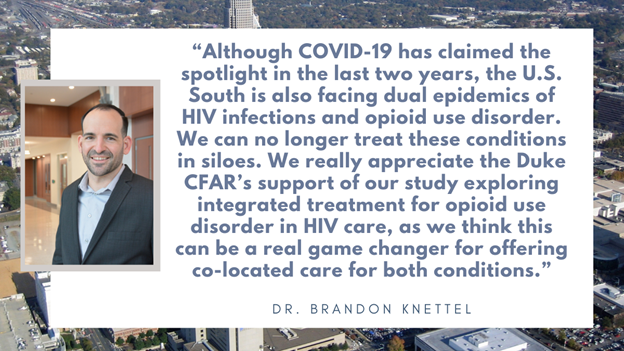
The Duke CFAR recently awarded two Microgrant Awards. These one-year awards for up to $20,000 are intended to facilitate HIV/AIDS research by providing modest, but essential, resources that are not readily available from other sources. The Microgrant program is designed to support new NIH grant applications that will increase the HIV/AIDS funded research base at Duke.
Dr. Schenita Randolph was awarded a CFAR Microgrant for her proposal, “Examining Organizational Culture and Context of Beauty Salons for Scalability and Sustainability of a Salon-Based Intervention to Improve the Awareness, Knowledge and Uptake of PrEP among Black Women in the United States South.”
Black women comprise 13% of all women in the United States, but account for nearly two-thirds of new HIV infections among women in the US. Pre-exposure prophylaxis (PrEP) taken daily can prevent new HIV infection, but improving the uptake of PrEP among Black women in the US South will require implementation strategies that address awareness, trust, and stigma, all identified barriers to PrEP uptake for this population.
To address the urgent need, Dr. Randolph and her team worked with the community to co-develop UPDO’s Protective Styles (Using PrEP and Doing it for Ourselves), a salon-based intervention to promote awareness, knowledge and uptake of PrEP among Black women living in the US South. UPDO’s Protective styles is a multi-level intervention that consist of three components: 1) training of stylists, 2) entertainment videos highlighting Black women’s health, social contributors to health, and PrEP knowledge and 3) the engagement of a PrEP navigator to link eligible women to PrEP services and resources.
Dr. Randolph received a CFAR Supplement in 2018 to collect formative data to inform the development of the intervention. Through funding from Gilead Sciences, Inc., she and her team are now testing the preliminary effects of UPDOs on PrEP awareness, knowledge and uptake by pilot testing the intervention with six salons.
However, missing from the literature on beauty salon interventions is an understanding of how beauty salon characteristics impact intervention delivery, how best to replicate salon interventions, and what salon characteristics offer sustainability of the intervention over time. Through the CFAR microgrant, Dr. Randolph will implement a mixed-method study to assess the organizational culture and context of the salon and evaluate how the beauty salon culture and context influences PrEP uptake among Black women during their pilot testing. This understanding can help inform implementation strategies to improve scalability and sustainability of UPDOs Protective Styles.
Says Dr. Randolph, "We are excited to be able to examine the organizational culture of beauty salons and the potential impact of salon cultures on the delivery and outcomes of the UPDOs intervention. We have been intentional about equally partnering with stylists and the community to develop a real world and sustainable intervention. Adding this component of investigation to our funded pilot study will allow us to consider factors that are necessary for scalability and sustainability. Thanks to Duke CFAR for their continued support of this important work."

Drs. Brandon Knettel and Susan Reif were awarded a CFAR microgrant for their proposal, “Implementation Strategies for Integrating Treatment for Opioid Use Disorder in HIV Care.”
In North Carolina, opioids contributed to 1,783 overdose deaths in 2018, making it the leading cause of injury deaths in the state. The relationship between HIV and Opioid Use Disorder (OUD) is bidirectional and syndemic. People living with HIV (PLWH) are commonly treated with opioids, creating risk for addiction. Simultaneously, PLWH who use opioids experience increased attrition across the HIV care continuum, including delayed entry into care, suboptimal linkage to treatment, and lower adherence to antiretroviral therapy.
OUD and HIV are both chronic conditions that are treatable with daily medication, with outcomes enhanced by strong psychosocial support. These similarities have led implementers to consider integrated treatment for HIV and OUD; however, there may also be unintended consequences to this model. Few prior studies have examined the potential benefits and consequences of integrating HIV and OUD treatment, particularly related to HIV care engagement.
Through the CFAR microgrant, Drs. Knettel and Reif will assess the benefits of an integrated model, while also examining whether unsolicited screening and referral for OUD treatment may add stress during a critical window for HIV care initiation, with potential to hinder long-term treatment adherence.
The team aims to obtain perspectives from implementing partners on the integration of treatment for OUD in HIV care in Mecklenburg Country, NC by conducting in-depth interviews with HIV clinicians, OUD and social services providers, and people who use opioids that are presenting for HIV services. They will explore the perceived value of care integration, the potential for negative consequences of integration on HIV care engagement, and implementation strategies for care integration that minimize disruptions in HIV care. These insights will inform a package of implementation strategies for HIV clinics to be tested in a future clinical trial.
Says Dr. Knettel, “Although COVID-19 has claimed the spotlight in the last two years, the U.S. South is also facing dual epidemics of HIV infections and opioid use disorder. We can no longer treat these conditions in siloes. We really appreciate the Duke CFAR’s support of our study exploring integrated treatment for opioid use disorder in HIV care, as we think this can be a real game changer for offering co-located care for both conditions.”
